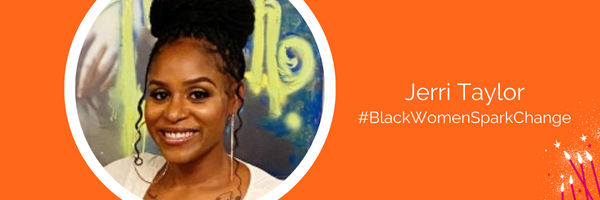
Jerri Taylor is the Director of Diversity in Career Pathways for Sustainable Forestry Initiative and Project Learning Tree. She leads a variety of mentorship programs to help diversify conservation and forestry careers and develops curricula that encourage BIPOC youth to gain a different perspective on the outdoors.
“No matter what your background is or the experiences you have in life, there’s a place for you here. That’s what I bring to the forest and conservation space,” Jerri says.
Working with youth from diverse backgrounds was always Jerri’s goal. But she was stuck in a “spin cycle” for years trying to figure out exactly what she wanted to do.
She loved law and policy in school but switched her focus to public health after discovering she had epilepsy. This invisible disability made it challenging for her to succeed in school and she considered dropping out before switching her major.
“I went into public health and fell in love with it because I love how families make decisions,” she explains.
Jerri worked as a research assistant for the SNAP program and Indian Housing Block Grant before taking a job as director of the After School Kids Program at Georgetown University. In this role, she noticed that all of her students who were on probation also had a disability.
“I found myself wanting to learn more and dig more,” she shares.
She moved into the inner city community where her students lived to get a better idea of what they were experiencing.
“It was interesting being in that space, where you have all these people that have been thrown away and forgotten, but they have all of these dreams and goals for their kids,” she says.
The Life-Changing Power of Mentorship
Jerri knew that education was a vehicle for change and wanted to help children from diverse backgrounds discover their full potential. But she was also still trying to find her true passion. When she accidentally wandered into the George Washington University School Counseling open house, she finally discovered what she was meant to do.
“That was the moment my life changed,” she explained.
She met the head of the program, Dr. Rebecca Dedmond, who encouraged her to apply and supported her along the way.
“If it wasn’t for this woman who saw me as a diamond in the rough and was able to see past all of my rough edges, I would have never made it here today,” she explains.
Jerri earned her Masters of Education in School Counseling and worked as a school counselor in a few different positions.
“My favorite part of school counseling was careers,” she shares. “I want to see something spark in them. And their spark was when they found their place in the world.”
Since graduating, Jerri has taught courses on career pathways with Dr. Rebecca Dedmond. Jerri knows that Dr. Dedmond’s support changed her life, and she works hard to offer the same level of support to the students she works with.
“I had this professor that really believed in me,” she adds. “I want to continue that as my legacy – making sure people know that they belong.”
Embracing Challenges and Taking Risks
After working in school counseling for years, Jerri took her current position with the Sustainable Forestry Initiative.
“Take risks and don’t let people tell you no, don’t stop yourself,” she shared.
Trusting herself and taking risks led Jerri to a job she loves that allows her to follow her dreams of helping BIPOC youth discover their place in the world. But this hasn’t always come easy.
“The biggest challenge that I faced was coming to grips with my invisible disability,” she explains.
Embracing every part of herself has allowed Jerri to better serve the diverse population of children she works with. She recently helped develop a new PLT resource called Black Faces in Green Spaces: The Journeys of Black Professionals in Green Careers which she says is her greatest achievement.
“Your spirit lives on, but how that lives on is the way you speak, what you put out in the world, those skills that you teach people,” she says. “I want to leave a legacy of hope and opportunity. And that’s what keeps me motivated.”
